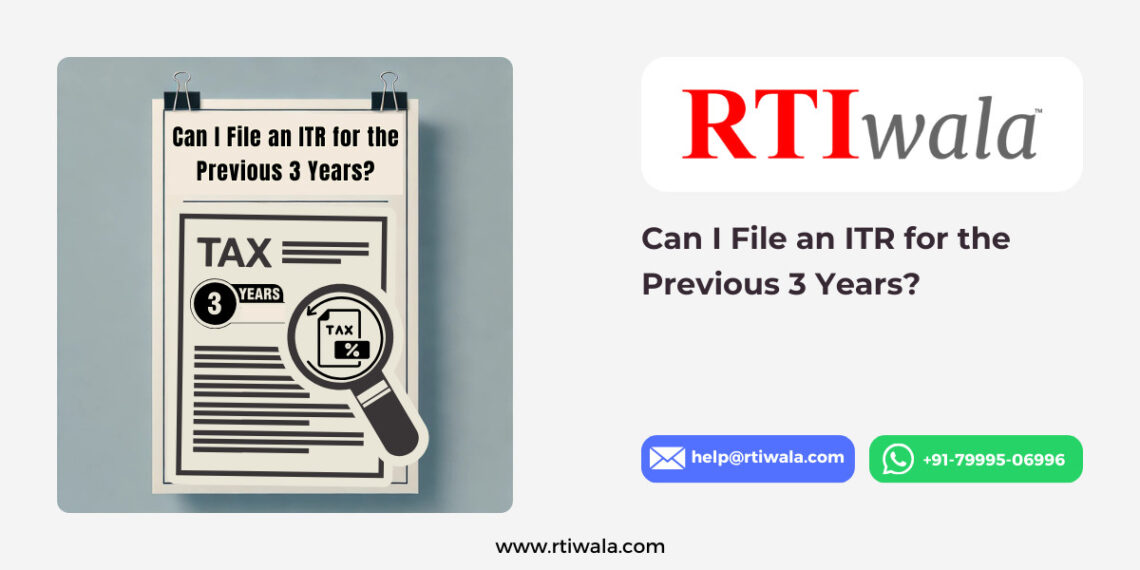Filing Income Tax Returns (ITR) is a legal obligation for eligible taxpayers in India. However, various circumstances may lead individuals to miss the filing deadlines. A common question that arises is: Can I file an ITR for the previous three years? Let’s delve into this topic comprehensively.
Understanding the Provisions and Limitations
The Indian Income Tax Department provides specific provisions for taxpayers who have missed filing their returns:
- Belated Return: If you miss the original deadline (usually July 31st), you can file a belated return. However, this must be done before the end of the relevant assessment year. For instance, for the Financial Year 2023-24 (Assessment Year 2024-25), the belated return can be filed until March 31, 2025. Filing beyond this period is not permitted.
- Updated Return (ITR-U): Introduced in the Union Budget 2022, the ITR-U form allows taxpayers to update their returns within 24 months from the end of the relevant assessment year. This means you can file or correct returns for the past two years. For example, for the Assessment Year 2022-23, you can file an updated return until March 31, 2025.
Therefore, while you cannot file returns for all three previous years simultaneously, you can file for the last two years using the ITR-U form.
Consequences of Not Filing ITR
Failing to file your ITR can lead to several repercussions:
- Penalties: A late fee of up to ₹5,000 can be levied under Section 234F of the Income Tax Act.
- Interest on Tax Due: An interest of 1% per month or part thereof may be charged on the outstanding tax amount under Section 234A.
- Prosecution: In severe cases, especially where tax evasion is evident, imprisonment ranging from 3 months to 2 years can be imposed.
- Loss of Refunds: If you are eligible for a tax refund, not filing your return means forfeiting that refund.
- Inability to Carry Forward Losses: Certain losses, such as business or capital losses, cannot be carried forward to subsequent years if the return is not filed on time.
- Impact on Loan Approvals: Financial institutions often require proof of ITR filings for loan approvals. Not filing can hinder your ability to secure loans.
Steps to File Belated or Updated Returns
If you’ve missed the original filing deadline, here’s how you can file your belated or updated returns:
- Gather Necessary Documents: Collect all relevant documents, including Form 16, bank statements, interest certificates, and details of deductions.
- Access the Income Tax Portal: Log in to the Income Tax e-Filing Portal.
- Select the Appropriate ITR Form: Choose the correct ITR form based on your income sources.
- Fill in the Details: Enter all required information accurately.
- Choose the Filing Type: If filing a belated return, select ‘139(4)’. For an updated return, choose ‘139(8A)’.
- Compute Tax Liability: Calculate your tax liability, including any interest or penalties.
- Pay Outstanding Taxes: Ensure all dues are paid before submission.
- Verify and Submit: After submission, verify your return through Aadhaar OTP, EVC, or by sending a signed ITR-V to the Centralized Processing Center.
RTIwala: Your Trusted Partner in Tax Compliance
Navigating the complexities of tax filings can be daunting. This is where RTIwala steps in as your reliable ally.
Why Choose RTIwala?
- Expert Guidance: Our team of professionals stays updated with the latest tax laws and ensures accurate filing.
- Timely Assistance: We help you meet deadlines, minimizing the risk of penalties.
- Confidentiality: Your financial information is handled with the utmost confidentiality and security.
Our Services Include:
- Filing Belated and Updated Returns: Assisting you in filing ITRs for previous years within the permissible time frames.
- Penalty Mitigation: Guiding you on ways to reduce penalties and interest liabilities.
- Continuous Support: Providing ongoing assistance for any tax-related queries or issues.
Act Now!
Delaying your ITR filing can lead to severe consequences. Trust RTIwala to guide you through the process seamlessly. Contact us today to ensure your tax compliance and peace of mind.





















































